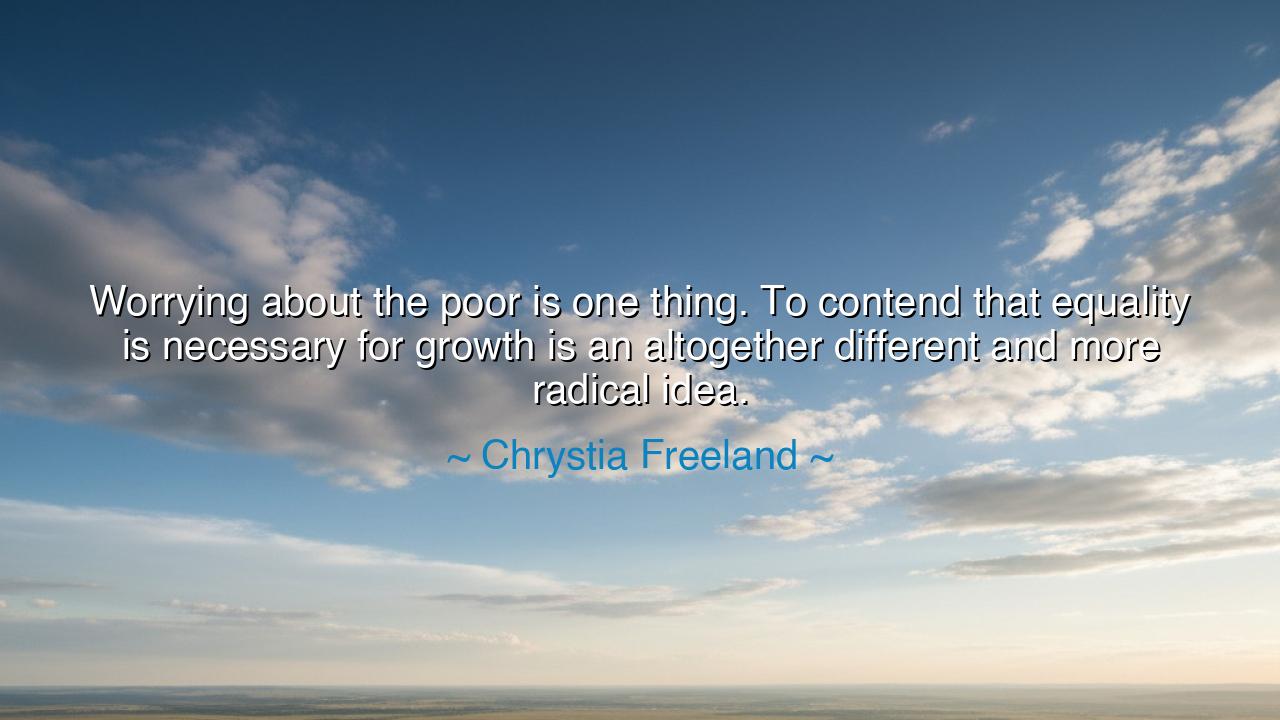
Worrying about the poor is one thing. To contend that equality is
Worrying about the poor is one thing. To contend that equality is necessary for growth is an altogether different and more radical idea.






“Worrying about the poor is one thing. To contend that equality is necessary for growth is an altogether different and more radical idea.” — Chrystia Freeland
In these words, Chrystia Freeland speaks a truth that cuts to the heart of civilization itself. Her message is not merely economic — it is moral, spiritual, and profoundly human. To worry about the poor is to express compassion, an emotion as old as humanity itself. But to believe that equality is necessary for growth, that the rising of one must depend upon the uplift of all, is a revolution in thought. It transforms pity into principle, charity into justice, and the fleeting act of giving into the enduring art of rebuilding. Freeland reminds us that the survival of societies, empires, and economies depends not on how much wealth they accumulate, but on how that wealth circulates among their people.
From the earliest dawn of civilization, the powerful have often mistaken generosity for equality. Ancient kings built temples and granaries for the poor, not because they sought justice, but to display benevolence. Yet, as the wise among them soon learned, a nation where only a few thrive cannot stand long. Egypt’s pyramids rose from the sweat of thousands who had nothing; Rome’s glory was built upon the backs of slaves. Each empire, mighty in its time, eventually fell — not from invasion, but from imbalance. History whispers the same warning through the ages: when the distance between the powerful and the powerless grows too vast, the foundation of society cracks.
The idea that equality fuels growth is not new, but it has often been ignored. In the 20th century, after the devastation of war, nations learned that prosperity could not flourish in a garden of inequality. The Marshall Plan, born from the ashes of Europe, rebuilt nations not through conquest but through shared opportunity. America, too, saw its greatest expansion not in eras of hoarded wealth, but when workers, farmers, and innovators rose together. The lesson was clear: growth is not the harvest of the few, but the field tended by the many. When the poor are empowered, the economy strengthens; when education and fairness spread, invention and progress follow.
Freeland’s quote shines a light on a deeper truth — that to champion equality is to challenge the very structure of privilege. To say that equality is moral is acceptable; to say it is necessary for growth is to threaten the comfort of the elite. It demands that society reconsider what “success” means, that the powerful admit their prosperity is intertwined with the fates of those beneath them. It is a radical idea, as Freeland calls it, because it does not merely comfort the poor — it demands transformation from the rich.
Consider the wisdom of Franklin D. Roosevelt, who during the Great Depression declared that “true individual freedom cannot exist without economic security and independence.” His New Deal was not born from charity, but from necessity — a recognition that unchecked inequality would destroy the nation’s spirit and economy alike. By investing in workers, farmers, and the forgotten poor, he rekindled hope and rebuilt an economy that served not just the powerful, but the people. Roosevelt understood what Freeland articulates: that growth and equality are not rivals, but partners in the great design of civilization.
And yet, every generation must relearn this lesson. The temptation to hoard power and wealth returns like a tide. The privileged tell themselves that compassion is enough — that to worry about the poor fulfills their duty. But worry without reform is like rain that never touches the soil. It soothes the conscience but nourishes nothing. To embrace Freeland’s vision is to act — to build institutions that uplift, to craft policies that open doors, and to ensure that prosperity flows, not stagnates, within society’s veins.
So let this be the wisdom carried forward: true growth is born not from greed, but from generosity institutionalized into justice. To care for the poor is kindness; to create equality is wisdom. A society that hoards wealth creates monuments to vanity, but a society that shares it builds legacies of endurance. The ancient philosophers taught that the greatest wealth is harmony — between man and man, rich and poor, ruler and ruled. Let us then not merely worry about the poor, but work toward a world where equality and prosperity rise together, like the twin pillars that uphold the temple of humanity. For only then will progress be not a privilege of the few, but the destiny of all.






AAdministratorAdministrator
Welcome, honored guests. Please leave a comment, we will respond soon